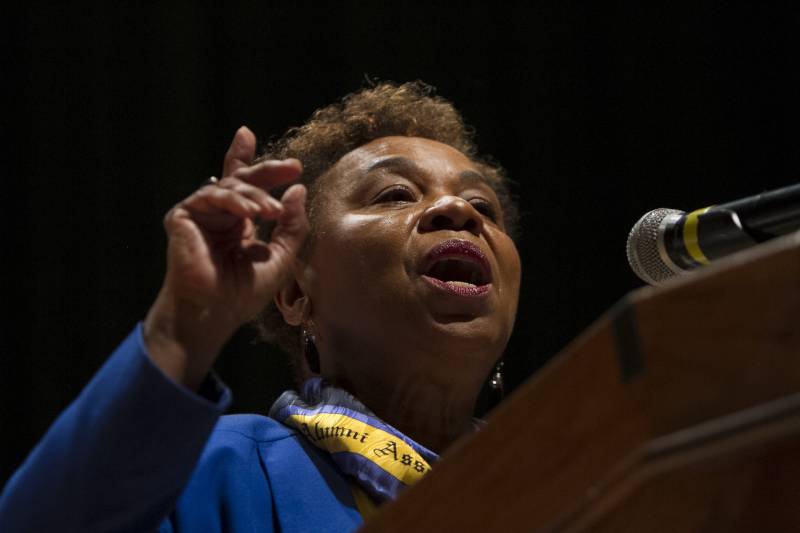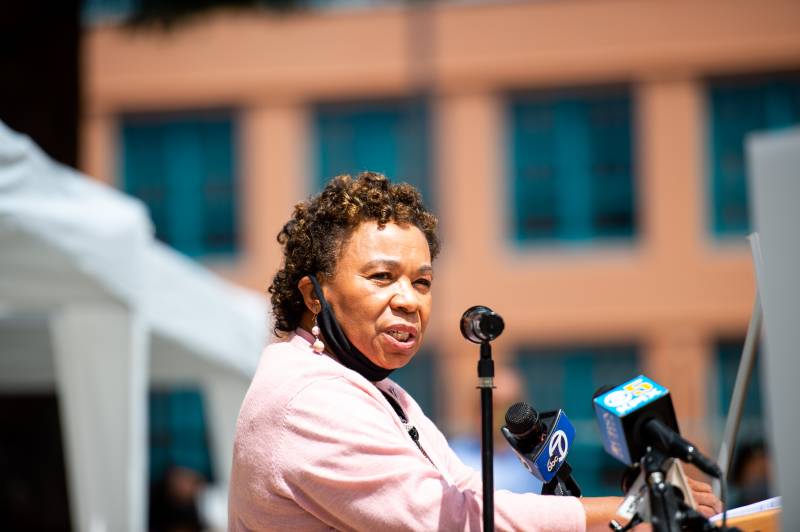California’s 13th Congressional District Representative Barbara Lee was the sole member of Congress to vote against the authorization of the war in Afghanistan 20 years ago.
It's a moment that features heavily in director Abby Ginzberg's new documentary "Barbara Lee: Truth to Power," which examines Lee's life and work as a Bay Area representative whose career in Congress has spanned 23 years, and which centers the conversation on Lee’s resolve to stand in opposition to her colleagues during a time of national crisis.
Lee and Ginzberg recently joined Alexis Madrigal on KQED Forum to talk about her storied career in Congress, her early days at Mills College and her thoughts on the latest developments in Afghanistan, two decades after her news-making vote. Read on for the highlights of their conversation.
Growing up amid segregation in Texas
Born in 1946, Lee grew up in segregated El Paso, Texas, down the street from Ron Stallworth, who went on to write "Black Klansman" — his autobiography detailing his experiences infiltrating the Ku Klux Klan — and who still lives in the area.
Lee attended Catholic schools — the only schools in the area that would allow Black students to attend at the time. As the only Black Girl Scout in her town, she was invited by her non-Black cohorts to attend events at the historic Plaza Theatre. However, Black people were only allowed in the balcony — a degrading experience that deterred Lee and many other Black community members from going.
The first movie Lee ever saw at the Plaza Theatre was Spike Lee’s 2018 film adaptation of Stallworth's “BlacKkKlansman.” The experience was, in Lee’s words, "remarkable," and one that she wished her "mother had been there" for.
Somewhat unsurprisingly, Lee wants Ginzberg’s documentary to play at the Plaza Theatre in the near future.

‘The right thing to do’
A trained social worker, Lee was able to, as Ginzberg put it, "find her moral center" during a time of "patriotic warmongering" immediately following 9/11.
"She understood what that 60-word resolution was going to lead us to," said Ginzberg. As the filmmaker sees it, it was Lee’s ability to set aside "national fervor" that made her "the one person in Congress who was able to do it."
It was after Rev. Nathan Baxter spoke at the Sept. 14, 2001, National Prayer Service that Lee made the decision to vote against a U.S. military intervention in Afghanistan. It was, said Lee, "a decision that did not come lightly."
In fact, this choice jeopardized her seat in Congress. "There are moments when you have to say, 'I'm risking everything because this is the right thing to do,'" said Lee.
When asked for her opinions on President Biden’s recent choice to withdraw the U.S. military from Afghanistan, Lee maintains that "he absolutely made the right call." She was, however, quick to critique the U.S. presence in Afghanistan, stating that "there is no military solution in Afghanistan."
"I believe we should have withdrawn many, many years ago when President Obama was in office," Lee said.
As the daughter of a retired lieutenant colonel who was a veteran of both World War II and the Korean War, Lee understands that "the dislocation and the violence and the trauma and the sadness that people have experienced over the last 20 years" is not easily fixed — in either the U.S. or in Afghanistan.
Lee is a chair of the subcommittee that funds the U.S. effort to withdraw from Afghanistan. This group’s focus, she says, is now on humanitarian assistance and diplomatic development assistance and an investment in nonmilitary strategies to provide security for women, and advocate for women’s education.

